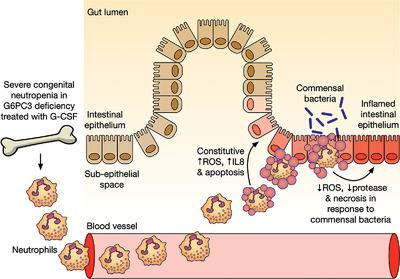当前位置:
X-MOL 学术
›
J. Leukoc. Biol.
›
论文详情
Our official English website, www.x-mol.net, welcomes your
feedback! (Note: you will need to create a separate account there.)
Neutrophil dysfunction triggers inflammatory bowel disease in G6PC3 deficiency
Journal of Leukocyte Biology ( IF 3.6 ) Pub Date : 2020-09-15 , DOI: 10.1002/jlb.5ab1219-699rr Anu Goenka 1, 2, 3 , John A Doherty 1 , Tariq Al-Farsi 2 , Christopher Jagger 1 , Siddharth Banka 4, 5 , Edmund Cheesman 6 , Andrew Fagbemi 7 , Stephen M Hughes 1, 2 , Robert F Wynn 8 , Tracy Hussell 1 , Peter D Arkwright 1, 2
Journal of Leukocyte Biology ( IF 3.6 ) Pub Date : 2020-09-15 , DOI: 10.1002/jlb.5ab1219-699rr Anu Goenka 1, 2, 3 , John A Doherty 1 , Tariq Al-Farsi 2 , Christopher Jagger 1 , Siddharth Banka 4, 5 , Edmund Cheesman 6 , Andrew Fagbemi 7 , Stephen M Hughes 1, 2 , Robert F Wynn 8 , Tracy Hussell 1 , Peter D Arkwright 1, 2
Affiliation

|
The glucose-6-phosphatase catalytic subunit 3 (G6PC3) encodes a ubiquitously expressed enzyme that regulates cytoplasmic glucose availability. Loss-of-function biallelic G6PC3 mutations cause severe congenital neutropenia and a diverse spectrum of extra-hematological manifestations, among which inflammatory bowel disease (IBD) has been anecdotally reported. Neutrophil function and clinical response to granulocyte colony-stimulating factor (G-CSF) and hematopoietic stem cell transplantation (HSCT) were investigated in 4 children with G6PC3 deficiency-associated IBD. G6PC3 deficiency was associated with early-onset IBD refractory to treatment with steroids and infliximab. The symptoms of IBD progressed despite G-CSF treatment. In vitro studies on the patients’ blood showed that neutrophils displayed higher levels of activation markers (CD11b, CD66b, and CD14), excessive IL-8 and reactive oxygen species, and increased apoptosis and secondary necrosis. Secondary necrosis was exaggerated after stimulation with Escherichia coli and could be partially rescued with supplemental exogenous glucose. HSCT led to normalization of neutrophil function and remission of gastrointestinal symptoms. We conclude that neutrophils in G6PC3 deficiency release pro-inflammatory mediators when exposed to gut bacteria, associated with intestinal inflammation, despite treatment with G-CSF. HSCT is an effective therapeutic option in patients with G6PC3 deficiency-associated IBD refractory to immune suppressants.
中文翻译:

中性粒细胞功能障碍引发 G6PC3 缺乏症的炎症性肠病
葡萄糖-6-磷酸酶催化亚基 3 ( G6PC3 ) 编码一种普遍表达的酶,可调节细胞质葡萄糖的可用性。功能丧失双等位基因G6PC3突变导致严重的先天性中性粒细胞减少症和多种血液学外表现,其中炎症性肠病 (IBD) 已有传闻。在 4 名 G6PC3 缺乏相关 IBD 儿童中研究了中性粒细胞功能和对粒细胞集落刺激因子 (G-CSF) 和造血干细胞移植 (HSCT) 的临床反应。G6PC3 缺乏与类固醇和英夫利昔单抗治疗难治的早发性 IBD 相关。尽管进行了 G-CSF 治疗,但 IBD 的症状仍在恶化。对患者血液的体外研究表明,中性粒细胞显示出更高水平的活化标志物(CD11b、CD66b 和 CD14)、过量的 IL-8 和活性氧,以及增加的细胞凋亡和继发性坏死。刺激后继发性坏死被夸大大肠杆菌,可以通过补充外源性葡萄糖部分挽救。HSCT 导致中性粒细胞功能正常化和胃肠道症状缓解。我们得出结论,尽管使用 G-CSF 进行治疗,但 G6PC3 缺陷中的中性粒细胞在暴露于与肠道炎症相关的肠道细菌时会释放促炎介质。HSCT 是免疫抑制剂难治性 G6PC3 缺陷相关 IBD 患者的有效治疗选择。
更新日期:2020-09-15
中文翻译:

中性粒细胞功能障碍引发 G6PC3 缺乏症的炎症性肠病
葡萄糖-6-磷酸酶催化亚基 3 ( G6PC3 ) 编码一种普遍表达的酶,可调节细胞质葡萄糖的可用性。功能丧失双等位基因G6PC3突变导致严重的先天性中性粒细胞减少症和多种血液学外表现,其中炎症性肠病 (IBD) 已有传闻。在 4 名 G6PC3 缺乏相关 IBD 儿童中研究了中性粒细胞功能和对粒细胞集落刺激因子 (G-CSF) 和造血干细胞移植 (HSCT) 的临床反应。G6PC3 缺乏与类固醇和英夫利昔单抗治疗难治的早发性 IBD 相关。尽管进行了 G-CSF 治疗,但 IBD 的症状仍在恶化。对患者血液的体外研究表明,中性粒细胞显示出更高水平的活化标志物(CD11b、CD66b 和 CD14)、过量的 IL-8 和活性氧,以及增加的细胞凋亡和继发性坏死。刺激后继发性坏死被夸大大肠杆菌,可以通过补充外源性葡萄糖部分挽救。HSCT 导致中性粒细胞功能正常化和胃肠道症状缓解。我们得出结论,尽管使用 G-CSF 进行治疗,但 G6PC3 缺陷中的中性粒细胞在暴露于与肠道炎症相关的肠道细菌时会释放促炎介质。HSCT 是免疫抑制剂难治性 G6PC3 缺陷相关 IBD 患者的有效治疗选择。











































 京公网安备 11010802027423号
京公网安备 11010802027423号